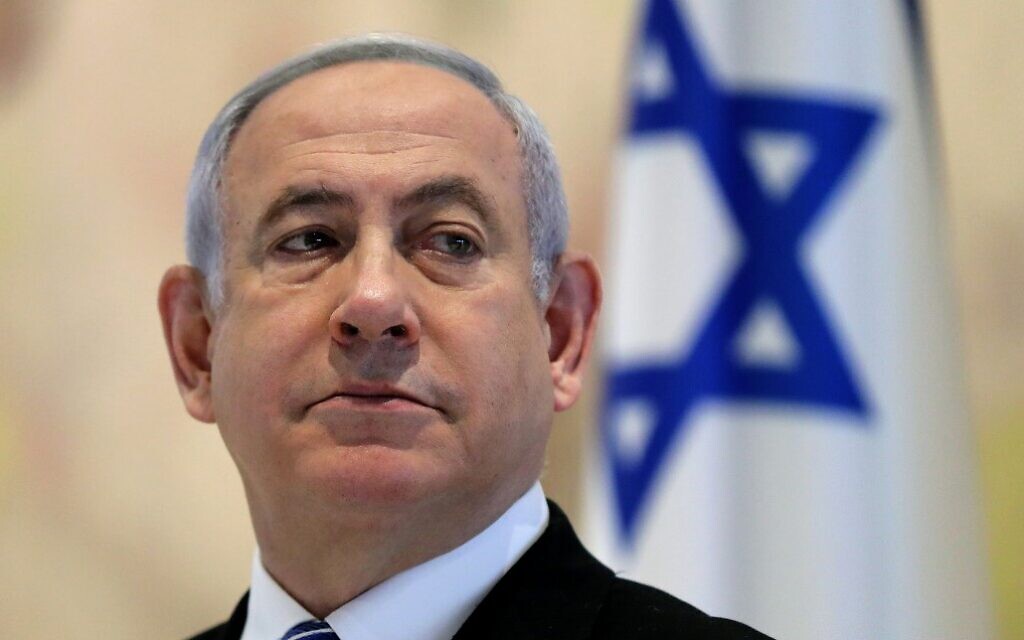
Non-obsessive followers of Israeli politics might be forgiven for thinking that we have been in the midst of a political crisis, possibly heading for our fourth elections in less than two years, but that a laudable compromise has now staved off that danger.
We are not, in fact, in a “crisis.” We are, rather, a nation held politically hostage to the personal calculations of Prime Minister Benjamin Netanyahu.
The emergency “unity coalition” he put together with his rival, Blue and White leader Benny Gantz, has been in power for barely three months. But Netanyahu, having defused the danger that Gantz might oust him, is perpetually ready to tear their alliance apart. He is simply probing for the right moment to do so — the right opportunity to ensure that Gantz will not succeed him in November of next year as their deal specifies; the right moment to seek the election of a new parliament that might be more receptive to his need for decisions and legislation to evade — or at least stall — his ongoing corruption trial, which goes into high gear in January.
At a televised press conference on Sunday night, Netanyahu graciously informed that dwindling proportion of the public that can still muster the strength to follow his political shenanigans that, for now, he was going to spare us yet another return to the polling stations. Having for months resisted the 2020-21 state budget law agreed to in his coalition deal with Gantz, he was not going to trigger the clause in the deal that automatically sends Israel to elections if the budget is not passed by Monday at midnight. “Out of national responsibility,” our leader proclaimed, “I decided to accept the compromise proposal of MK [Zvi] Hauser” that averts our fourth rapid-fire elections by instituting emergency state budget provisions.
“Now is the time for unity, not for elections,” he solemnly intoned for all the world, as though he were heroically rescuing Israel from an opponent’s devious stratagem, when in reality he was its instigator.
What Netanyahu actually meant, though he naturally left it unsaid, was that he had deemed the risk of further elections, at this particular juncture, unwarrantedly high.
His Likud is slipping a little in the surveys — Israelis may be truly delighted by the breakthrough peace agreement with the United Arab Emirates and the promise of more deals to follow, but such pleasure is more than offset by the job losses, domestic financial crises and other dismal consequences of COVID-19, and Netanyahu is quite widely blamed for mishandling the economic side of the pandemic.
By contrast, one of his nemeses, Yamina’s Naftali Bennett, is soaring in the polls — both on the strength of his criticism of the government’s COVID-related policies, and as the champion of the pro-settlement voters outraged by Netanyahu’s abandonment — as the necessary price of the UAE deal — of his pledge to extend Israeli sovereignty to all West Bank settlements and the Jordan Valley. And Bennett, who has already stated that he will not automatically recommend Netanyahu as prime minister next time around, can no longer be counted as a reliable part of the Netanyahu-led bloc — a highly significant development that remakes the prime minister’s electoral calculations, potentially placing Bennett in the ally-turned-enemy camp alongside the loathed Avigdor Liberman.
Netanyahu was also aware that even his more dependable allies, the two ultra-Orthodox parties, were fairly horrified at the prospect of forcing the public back to the polls again. Whisper it too: Many of his own Likud MKs share these reservations.
He may even have taken into account that his vital allies in the US might take a dim view of his sending Israelis out to vote again at the very moment the administration wants his government focused, when not battling COVID-19, on seizing the moment to expand Israel’s circle of peace.
All of which means that the early-election gambit isn’t over; it has just been pushed off a little. The temporary Hauser compromise still doesn’t give Israel an actual state budget for 2020-21 — with dire ongoing consequences for the public, and working class Israelis in particular — and therefore it leaves open the opportunity for Netanyahu to consider precisely the same maneuver a few months from now.
Non-obsessive followers might be surprised by some of the above. Not so the Israeli electorate. A Channel 13 survey, released Sunday night precisely as Netanyahu was grandly lifting the election shadow from over Israel, found that 59 percent would blame him if we were forced into another vote, compared to just 20% holding Gantz responsible. More worryingly for Netanyahu, the survey showed that 50% of respondents believe the “main factor” influencing Netanyahu’s political decisions right now is “his legal future,” and only 18% think he is primarily weighing “the interests of the state.”
These, evidently, were not the findings to inspire a fresh resort to the ballot boxes. But the non-crisis isn’t over. Our leader, in his wisdom, has merely determined that now is not the time.
 RSS Feed
RSS Feed















 August 24th, 2020
August 24th, 2020  Awake Goy
Awake Goy  Posted in
Posted in  Tags:
Tags: 













